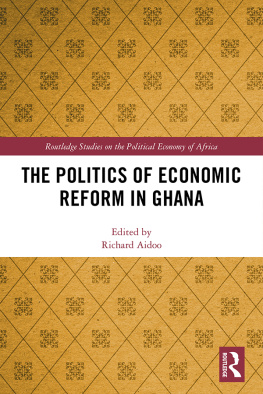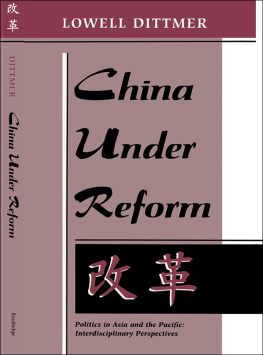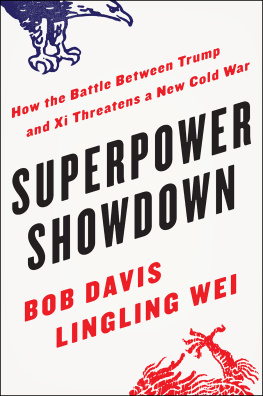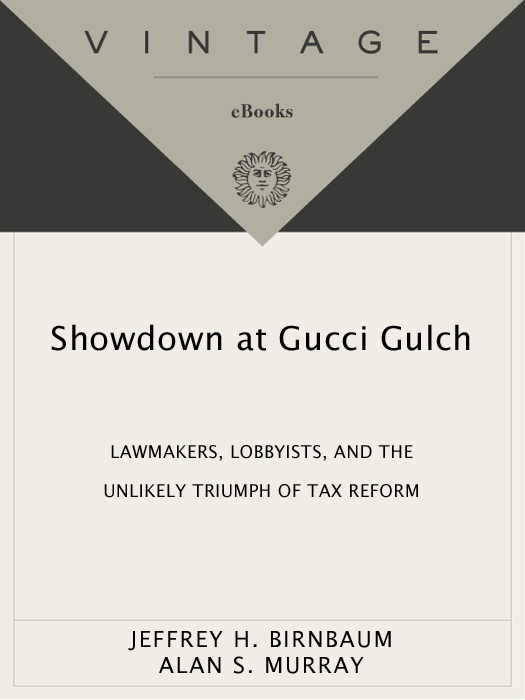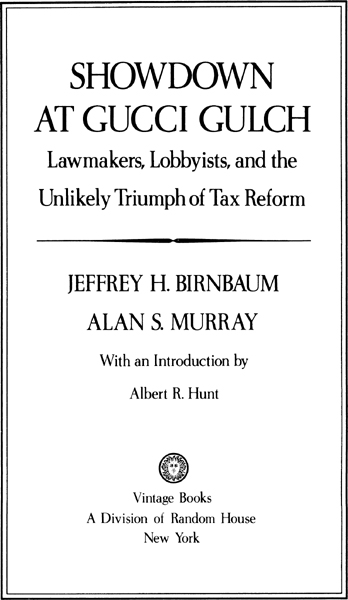P RAISE FOR
Showdown at Gucci Gulch
Showdown at Gucci Gulch reads like a thriller, which it is, with a remarkable cast of characters and a payoff in billions. That it is also a superb piece of reporting on one of the most important pieces of legislation in yearsthe 1986 tax billis an added bonus a great case study of the political processand a terrific read.
David S. Broder, chief political reporter and columnist, Washington Post
I really enjoyed it. It will serve a long, long time as a guide to how the sausage is made up here.
Treasury Secretary James A. Baker III
I think it has a good chance of becoming a textbook on the legislative process.
Senator Bill Bradley
A tremendous and well-told story. This is a book for everybodyas interesting as it is illuminating. I learned a lot about the legislative process in the 1980sand enjoyed myself thoroughly.
Richard Neustadt, professor of government at Harvard University and author of Presidential Power
The tax reform act of 1986 was one of the most extraordinary economic policy initiatives of the twentieth century. Messrs. Birnbaum and Murray have done a first-rate job in delving into the politics and personalities of the key players.
Dr. Alan Greenspan, chairman of the Federal Reserve
Showdown at Gucci Gulch is likely to be the standard narrative of tax reform for years to come.
Boston Globe
To our beloved personal exemptions:
DEBORAH AND MICHAEL ;
AND LORI
Acknowledgments
This book was made possible by the generous and unfailing support of Albert R. Hunt, the Washington bureau chief of The Wall Street Journal. He guided the Journals day-to-day coverage of the legislation itself and remained, through to the completion of the book, the best-informed tax reporter in Washington. As the manuscripts first editor, he saved the authors from making some embarrassing mistakes and allowed them to take credit for his insights.
The authors also would like to thank the senior editors of The Wall Street Journal, particularly Norman Pearlstine, the managing editor, for encouraging comprehensive coverage of the tax bill, for permitting the leave of absence during which this book was written, and for making the Journals resources available during that period.
Throughout the writing of this book, we received invaluable help from Terence Patrick Moran, who provided crucial research and editing assistance, and who was always able to find the answers to the questions that stumped us. We also owe a debt of gratitude to Linda Himelstein, who gave up her summer weeks at the beach to contribute to the research effort. And our lives were made much easier by our speedy transcriber, Jamie Richardson. We also thank our attorney, Robert Barnett, of Williams and Connolly.
Like all reporters, we are indebted to our editors. Peter Osnos of Random House deserves special thanks for coming to us with the idea for this book and for taking the lead in keeping our effort on track and turning two daily journalists into book writers. But we must also thank those who guided us in our work at the Journal: Paul Steiger, Ken Bacon, Bob McGilvray, Walter Mossberg, and Henry Oden and his skilled editors.
We owe a great deal, of course, to our sources. Since most of the tax story took place behind closed doors, they became our eyes and ears in reporting this story. Many prefer to remain anonymous, but we give them all our heartfelt gratitude. This is their book. And special thanks to those on congressional staffs, at the Joint Tax Committee, and at the Treasury Department, who took time out of their busy days to explain complicated tax matters to two green reporters.
Special thanks to the readers of our manuscript: Richard Fenno and James Wetzler. Thanks also to Willis Gradison, Catherine Porter, William Wilkins, and John Wilkins.
Writing a book is no easy task, and it would not have been possible without the support of our families. We are grateful to our parents, who deserve credit for the best we have achieved, but no blame for the rest: Esther Birnbaum, Earl Birnbaum, Catherine Murray, and John Murray. We also thank other members of our families, including Ezra Franks, Rhoda and Norman Galembo, Lucy Mele, and Erich Alan Murray.
Most important, we thank our wonderful wives, who supported us throughout this project and who contributed many suggestions that led to the improvement of the book: Deborah Birnbaum and Lori Esposito Murray.
Contents
Introduction
by Albert R. Hunt
The Tax Reform Act of 1986 was the best political story of its time, full of suspense, and with a vivid cast of characters. It marked the most significant achievement of the second Reagan administration. Indeed, in the history of the Republic, very few pieces of legislation have more profoundly affected so many Americans.
This saga was all the more dramatic because it was so unlikely. When the Ninety-ninth Congress convened, tax reform barely was on the agenda. Ronald Reagan, of course, won a resounding reelection victory in 1984, but so did 95 percent of incumbent congressional Democrats, many of whom had spent the previous four years challenging the president. The only tax message in that campaign was a rejection of Walter F. Mondales call for a tax increase. The issue of tax reform never was joined in that campaign; so clearly no consensus on what to do could be formed.
Further, most political scientists, lawmakers, and informed analysts were convinced that radical or fundamental change was impossible. Even the first Reagan term produced only a modest amount of really significant change, and second terms traditionally are less productive. Above all, any fundamental change that affected the powerful, growing special interests seemed a political pipe dream. The importance of special-interest campaign contributions caused many to suggest that this was the best Congress money could buy.
The 1986 tax bill endured a roller-coaster existence for almost two years. Tax reform never has been easy, and its rare successes have been aberrational. In 1969 Congress cracked down on abuses by foundations and initiated a minimum tax for the wealthy, but only after outgoing Treasury Secretary Joseph Barr caused a national uproar when he revealed that hundreds of millionaires didnt pay any income taxes. In 1975, the oil depletion allowance was repealed for major oil companies, but only after long gas lines and soaring prices made the oil industry public enemy number one.
That this measure even was considered defied the conventional wisdom. No modern president has so opposed the concept of corporate taxes or had as many rich friends who benefited from tax loopholes as Ronald Reagan. Yet the Reagan tax-reform initiative involved the largest corporate tax increase in history and the most drastic crackdown on loopholes for the affluent.
On Capitol Hill, there was never much enthusiasm for the measure, reflecting, in part, what the lawmakers were hearing at home. Most of their constituents viewed the current tax system as a disgraceful sop to the privileged, but this never translated into public support for any tax-reform proposal. A skeptical public generally felt that as bad as the current tax system was, any changes probably would compound the inequities and increase taxes for the average citizen.


